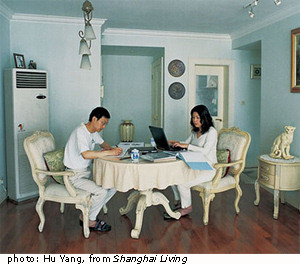|
 |
|
| UCLA - Village Videos and the Cultural Politics of Media in Rural, Ethnic China (11/23) |
|
| 作者:UCLA-CCS | 2010/11/17 5:56:22 | 浏览:3562 | 评论:2 |
|
|
|
|
|
A talk by JENNY CHIO(China Research Centre, University of Technology, Sydney)
Tuesday, November 23, 2010
3:30 PM
University of Southern California
In rural Guizhou province, there is a vibrant media world of video recordings of ethnic festivals and competitions. This talk explores the popularity of these “village videos,” which are made by semi-professional videographers who sell them locally in shops and markets. The content of village videos, ranging from ethnic festival performances to bullfights and other traditions, reimagine rural and ethnic identities by finding visual ways to represent rural sociocultural lives. As a form of nonstate media production, village videos indicate new attempts at local levels to make sense of national narratives and transnational expectations of ethnic identity in contemporary China.
Unlike more recent, well-publicized rural video projects led by urban academics and filmmakers in China, the village videos addressed in this talk are created and consumed wholly in local terms, by local individuals for local audiences in the predominantly Miao region of southeast Guizhou. Village videos are significant both in terms of understanding mainstream Chinese desires for images of the Miao and the consumption of visual representations of ethnic identity. The processes of cultural production and cultural consumption are complicated in the case of village videos, where rural, ethnic peoples and communities utilize visual media as a means for asserting agency and belonging in national and international networks. Thus, village videos are a crucial site for exploring shifting loci of power at work in visualizing, and imagining, ethnic identity.
***
Jenny Chio is a Postdoctoral Research Fellow at the China Research Centre, University of Technology, Sydney, where she is conducting research on rural media production in China. She is also editing an ethnographic film on rural, ethnic tourism in China titled Nong Jia Le:Peasant Family Happiness. She received her PhD in Anthropology from the University of California, Berkeley in May 2009, and she holds a Masters degree in Visual Anthropology from Goldsmiths College, University of London. Her research interests include documentary image studies, contemporary rural Chinese society, and critical approaches to theorizing mobility. She serves as an elected Board Member of the Society for Visual Anthropology, a section of the American Anthropological Association.
Tel:(213)740-1900
anthropology@college.usc.edu
A talk by SHEN YIFEI(Fudan University)
Monday, November 22, 2010
4:00 PM - 5:30 PM
11377 Bunche Hall
UCLA

It is generally acknowledged that modernization has given rise to the nuclearization of the family, with an emphasis on conjugal rather than generational(parent-child)ties. In light of this assumption about the transition toward the "modern form," the developmental trajectory of the Chinese family has appeared identical with its Western counterpart, ad its particularities have been rendered irrelevant.
By way of a thick description of 46 white-collar families(households shared by couples and their parents), this talk aims to show that the conventional classification scheme of families(nuclear/stem/joint families)has led to zombie categories which are divorced from reality. Professor Shen argues that we need a new approach to analyzing the increasingly diverse, multi-level family structure and intergenerational relations. Guided by the insights obtained from the theory of individualization, Shen set ups a new analytical framework for the ethnographic inquiry into the inner workings of the Chinese family under the dual impact of modernization and traditionalism.
The individualized family emphasizes expressing its own identity upon which the family structure is constructed and the model of handling family relationship is built. In a radical departure from its familistic past, the individualized family prioritizes the role of the individual in norms and practices, a sharp departure from the patriarchal system. The organization of the individualized family differs from that of the quintessentially Western individualistic family in that the close-knit intergenerational and parent-child bond in the former exemplify the survival of "tradition" in the modern.
The concept of the "individualized family" provides a new perspective for analyzing the logic of everyday life and obtaining a better understanding of intergenerational relations. If appropriately applied, the findings of Professor Shen's research may help offer policy recommendations in terms of resolving intra-family conflicts and related social and community problems.
Shen Yifei(Ph.D., Sociology, Fudan University, 2010)is a Lecturer in the Department of Sociology, Fudan University. Among her publications(in Chinese)are A Study of Gender Mainstreaming in Specific Policy Contexts in China:Political Participation, Legal Status, and Social Security(Shanghai Academy of Social Sciences Press, 2008), and Women Are Constructed:Contemporary Theories of Gender(Shanghai Renmin Press, 2005).
Village Videos and the Cultural Politics of Media in Rural, Ethnic China
A talk by JENNY CHIO(China Research Centre, University of Technology, Sydney)
Tuesday, November 23, 2010
3:30 PM
University of Southern California
In rural Guizhou province, there is a vibrant media world of video recordings of ethnic festivals and competitions. This talk explores the popularity of these “village videos,” which are made by semi-professional videographers who sell them locally in shops and markets. The content of village videos, ranging from ethnic festival performances to bullfights and other traditions, reimagine rural and ethnic identities by finding visual ways to represent rural sociocultural lives. As a form of nonstate media production, village videos indicate new attempts at local levels to make sense of national narratives and transnational expectations of ethnic identity in contemporary China.
Unlike more recent, well-publicized rural video projects led by urban academics and filmmakers in China, the village videos addressed in this talk are created and consumed wholly in local terms, by local individuals for local audiences in the predominantly Miao region of southeast Guizhou. Village videos are significant both in terms of understanding mainstream Chinese desires for images of the Miao and the consumption of visual representations of ethnic identity. The processes of cultural production and cultural consumption are complicated in the case of village videos, where rural, ethnic peoples and communities utilize visual media as a means for asserting agency and belonging in national and international networks. Thus, village videos are a crucial site for exploring shifting loci of power at work in visualizing, and imagining, ethnic identity.
***
Jenny Chio is a Postdoctoral Research Fellow at the China Research Centre, University of Technology, Sydney, where she is conducting research on rural media production in China. She is also editing an ethnographic film on rural, ethnic tourism in China titled Nong Jia Le:Peasant Family Happiness. She received her PhD in Anthropology from the University of California, Berkeley in May 2009, and she holds a Masters degree in Visual Anthropology from Goldsmiths College, University of London. Her research interests include documentary image studies, contemporary rural Chinese society, and critical approaches to theorizing mobility. She serves as an elected Board Member of the Society for Visual Anthropology, a section of the American Anthropological Association.
Tel:
anthropology@college.usc.edu
|
|
|
|

























